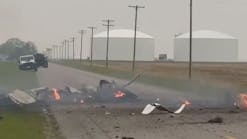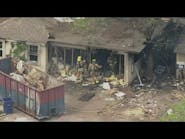I have hearing damage and tinnitus that has been documented as an occupational injury caused by high-decibel sounds directly related to on-the-job noise generators like sirens, air horns, diesel motors, loud radios and power tools, and high-decibel fire alarm systems inside buildings.
I was an employee of the Boston Fire Department for 32 years and retired with a non-disability pension in October 2001. I first noticed a tinnitus sound in the early 1980s. This was reported and documented. The tinnitus sound gradually became louder over the years. (Tinnitus may be pronounced tin-NIGHT-us or TIN-nit-tus; either is correct.)
It was on a cold winter's night in December 1999 that I was the incident commander at a structure fire. As I stood at the front of the structure directing operations, an engine pulled up beside me with its electronic siren blaring into my left ear. The officer and the pump operator exited the engine and no one silenced that siren for about a minute. When I returned to quarters after the termination of the incident, I noticed that the tinnitus sound was much louder than it had ever been before. It did not stop, and I filled out an injury report.
The tinnitus was relentless and soon caused me to go into a depression that put me out of commission and on injured leave. I lost over 20 pounds in three weeks due to a loss of appetite. I looked pretty good, but that was not the way to diet! I developed tremors. The drugs prescribed by a physician only made my condition worse. I soon realized that I was heading into a black hole.
Thankfully, I found a hearing and tinnitus clinic in New Haven, CT, where my condition was accurately evaluated and I found help from compassionate caregivers. I was put on a long term care program called Tinnitus Retraining Therapy, or TRT. The TRT, family support and prayer saved me and brought me back to physical and emotional health over many months' time. During that time, I had several minor relapses, but I stayed the course of TRT until tinnitus became almost a non-issue to me. Today, I still have tinnitus, as there is no "cure" for this condition. I still have days and nights when the tinnitus sound is bothersome. However, I am better able to cope and I have many good days and good nights. Yet, the battle is never fully over, and people who have tinnitus and are coping are called "tinnitus survivors."
An Overview Of Tinnitus
From the American Tinnitus Association (ATA): Tinnitus is a subjective experience where one hears a sound or sounds when no external sound is present. Some call it "head-noises" or "ear-ringing." The word "tinnitus" is from a Latin word meaning "to ring like a bell" (no pun intended to firefighters). There are many causes of tinnitus (and hearing damage); i.e., overproduction of ear wax, acoustic tumors, and disorders of the head, neck and jaw. Pulsatile tinnitus can be caused by blood vessel abnormalities, certain medications and excessive use of aspirin, carbon monoxide (CO) and other gases; and exposure to loud sounds on the job or recreationally (such as listening to loud music or shooting a gun).
According to the paper "Historical Aspects of Tinnitus," there are documented cases of tinnitus treatments throughout history, the earliest dating back to ancient Egypt. Sedative medication was used for tinnitus in the Roman period. Aristotle and Hippocrates mentioned tinnitus in their writings.
Recent statistics gathered in the U.S. depict a serious problem with tinnitus. Two million people are debilitated by tinnitus, 10 million experience a significant problem and 32 million experience tinnitus, but are not bothered by it. It is also a problem of aging ears - 30% of Americans above age 65 have tinnitus.
The auditory (hearing), limbic and autonomic nervous systems and the cortex of the brain are among the systems interacting to produce the tinnitus sound or signal. Forms of excitement, stress and tension, too much caffeine or alcohol, and the human body's adrenaline can exacerbate the tinnitus sound as can loud external sources of noise.
Noise And Hearing Loss
Randy L. Tubbs, Ph.D., of the National Institute for Occupational Safety and Health (NIOSH), stated, "Hearing loss from occupational noise exposure is a completely preventable disease. This premise is based on the simple fact: if we are able to stop excessive noise from entering the ear, no loss of hearing can result from an occupational noise source. Even though this statement has been accepted as truth for a long time, firefighters, EMS and law enforcement personnel continue to lose hearing as a result of their occupation, despite regulations and education. Noise-induced hearing loss is an irreversible, sensorineural condition that progresses with exposure. …This noise-induced hearing loss is caused by damage to nerve cells of the inner ear (cochlea) and cannot be treated medically."
The documentation of noise exposure in the fire service was first reported in the 1970s. NIOSH began its involvement with firefighter noise exposure in 1981 with the Newburgh, NY, Fire Department; in 1982 with the FDNY; in 1985 in the Memphis Fire Department; and in the Pittsburgh Bureau of Fire in 1988. The International Association of Fire Fighters (IAFF) worked with NIOSH at two annual IAFF conventions in 1984 and 1987 to obtain data about hearing damage. The IAFF produced a booklet, Fire and Emergency Service Hearing Conservation Program Manual, that recognizes the problems of noise-induced trauma and outlines a program to reduce and/or prevent the occupational noise-induced hearing damage associated with sirens, air horns, loud motors and other noises associated with emergency response services.
National Fire Protection Association (NFPA) Standard 1500 addresses noise exposure to firefighters: "To comply with NFPA 1500, a fire department MUST provide hearing protection for all firefighters riding on apparatus who are subject to noise levels above 90 decibels. A decibel is a unit of measurement used to express sound levels. According to OSHA standards, firefighters are often exposed to noise levels well above 90 decibels." (This is a noise level that is damaging to humans.) "NFPA 1500 requires that a fire department must establish a hearing conservation program …"
Tubbs states: "When people think of hearing loss and partial deafness, they immediately think about a quiet world that they will be forced to live in. In some cases that cannot be further from the truth. Few people realize that noise-induced deafness results in a loud, annoying sound inside one's head that just never quits. It interferes with sleep, watching TV, listening to people and reading a book, almost all facets of daily living. So, loss of hearing does not equal a quiet day of fishing during our retirement years. It can be a screaming inside our heads that never stops." (Tinnitus!)
An even lesser known problem with tinnitus and hearing damage is hyperacusis, which is a heightened sensitivity to sound, especially loud sounds. People with hyperacusis cannot tolerate such noises. They may not even be able to tolerate "normal" everyday sounds like conversation. Because of my tinnitus problem, I find that noisy locations like many restaurants and movie theaters are not tolerated well or at all. I avoid them. I also carry and use earplugs that were specifically molded for my ears. These small implements are designed to attenuate excessive harmful noise.
Legal Issues
Since hearing damage and/or tinnitus can sometimes be directly correlated to noise-induced trauma from tools and equipment that are required and are an integral part of emergency response agencies, documenting occupational injuries to one's physical hearing system is important. Proof of occupational noise induced hearing loss and/or tinnitus can lead to disability retirement, litigation or both.
One of the largest and best-known manufacturers of sirens is the Federal Signal Corp. I contacted Federal Signal and was directed to Jennifer Sherman, deputy general counsel. I asked her a number of questions related to the subject at hand and she responded: "Thank you for the opportunity to comment on the issue of firefighter hearing loss and tinnitus. The safety and health of firefighters and the public is a high priority for Federal Signal. Federal Signal designs and manufactures its products to help emergency workers get to fires and accidents safely and quickly. Sixteen lawsuits involving 1,000 plaintiffs have been filed against Federal Signal. It is unfortunate that some lawyers have inaccurately characterized our products as creating a safety risk for firefighters.
"Scientific studies of the hearing levels of firefighters show that, while some firefighters have hearing loss, their hearing as a group is no different than persons of the same age who have never been exposed to occupational noise. It is not surprising that some firefighters have hearing loss. There are many causes of hearing loss, including age, family history, systemic diseases and childhood infections. Approximately 25% of all men entering the workplace already have hearing losses. Further, many firefighters have served in the military or have other noise exposure away from the workplace. …Simply because firefighters have hearing loss, however, does not mean that these hearing losses were caused by their jobs.
"Scientific studies of noise levels in the fire service are well below the level considered safe, and too small to cause hearing loss. These studies have been conducted in several large cities, including a six-month survey performed in Philadelphia, PA, by a research scientist for the National Institute for Occupational Safety and Health (NIOSH), and a recent project conducted in Chicago by the Illinois Department of Labor. These results are not surprising. While some equipment used by firefighters is certainly loud, the (amount) of time each day that this equipment is used is extremely limited, unlike the work practices in other industries.
"You asked about Federal Signal's efforts to insure product safety. Almost 20 years ago, Federal Signal participated in efforts to encourage (apparatus) manufacturers to mount sirens in locations (on fire apparatus) that reduce the sound levels in the cabs of fire trucks. This effort led to the NFPA standard on siren locations. Federal Signal also educated the firefighting community about the need to consider hearing conservation programs. The responsibility for occupational safety and health lies with the employer, and the employee also has an obligation in this area. FEMA has long published guidelines recommending that fire departments consider implementation of formal hearing conservation programs. Many fire departments have made hearing protection or communication headsets available for years.
"Federal Signal has reviewed alternate siren designs. Sirens are manufactured to meet standards set by state and federal agencies. These standards reflect the need to warn drivers and pedestrians. To date, no alternative siren design has been effective in insuring the safety of emergency responders and other motorists. The key to reducing noise levels for firefighters is the effective use of hearing protection or communication headsets."
Hearing damage and tinnitus caused by occupational noise exposure may or may not be compensable in the state where you work. There may also be a statute of limitations from the time an injury is reported to the time that a legal action is taken and an injured plaintiff may not be able to advance his or her case through the legal system. It may also be difficult to find an attorney who is knowledgeable about hearing damage and tinnitus injury claims in the field of emergency responders. Choose your attorney carefully if you are contemplating any legal action for hearing damage or tinnitus.
There Is Help And Hope
When I was severely stricken with tinnitus, I thought that there was no hope for me. I was examined by several ear, nose and throat (ENT) physicians. They all told me basically the same story after examination and testing: "Yes, you have hearing damage and tinnitus. There is nothing that can be done for the tinnitus. Go home and learn to live with it."
That type of prognosis from an ENT is not what the tinnitus sufferer needs to hear. The patient needs to have help and hope. Fortunately, ENT physicians are becoming more educated about tinnitus and are offering that much needed help and hope through referrals to tinnitus clinics and/or prescribing medications that can reduce the anxiety that tinnitus causes.
Janice A. Howard, MA, CCC-A, of the New England Tinnitus and Hyperacusis Center in Hamden, CT, states: "Tinnitus can interfere with sleep, concentration and the overall enjoyment of life. Ten to 12 million people in the U.S.A. are severely affected by it.
"There are numerous causes of tinnitus including, but not limited to, hearing loss, a blow to the head, whiplash injury, noise exposure (either a sudden loud noise or a noise of prolonged duration) and physical or emotional stress. Firefighters are at great risk for damage to the ear from sounds of sufficient intensity. Some siren sounds can be measured at approximately 120 decibels. Repeated exposure to sounds greater than 85 decibels can cause structural damage to the inner ear resulting in permanent hearing loss and/or tinnitus.
"At present, there is no known cure for tinnitus. However, at the New England Tinnitus and Hyperacusis Center we are employing a method called Tinnitus Retraining Therapy (TRT) that was developed by Dr. Pawel Jastreboff of Atlanta, GA. This treatment consists of educational counseling and sound therapy via a small in-the-ear device that emits a low-level broad-band sound (white noise) that mixes and blends with the tinnitus signal creating a contrast within the auditory system. This coupled with educational and cognitive counseling sessions leads to 'tinnitus habituation' as a result of TRT. For a majority of the time, the patient is no longer aware of the tinnitus, but can still perceive it if he or she consciously focuses on it. The tinnitus signal is still present, but it is blocked from the conscious part of the brain's cortex. The TRT takes approximately two years and has an 80% success rate. Upon completion of the TRT program, most patients are able to resume a normal life pattern."
Here are some recommendations to help you if you have hearing damage and/or tinnitus:
- Contact an ENT physician who is educated about tinnitus.
- Go on-line and use the key word "tinnitus." You'll be surprised at the number of websites that are available. A word of caution when you do this: There are enterprising people out there who make claims of a "cure" for tinnitus and they want your money.
- Contact the American Tinnitus Association (ATA) at 800-634-8978 or click onto its website, www.ata.org, and consider becoming a member. The ATA offers a large amount of reliable information to those with tinnitus.
According to recent news from the ATA, "The ATA received requests from U.S. congressional committees to give expert written testimony on a bill under consideration. The Veterans Hearing Loss Compensation Act mentioned tinnitus specifically as a condition for veteran disability compensation. Through deliberations, senators and representatives gained a much greater understanding of tinnitus, including its impact on the 50 million Americans with tinnitus, its causes including excessive noise exposures…and the critical need for tinnitus research."
- TRT worked for me. It may work for you. Most TRT clinics can be located through the Internet. There are clinics in New Haven, CT; Baltimore, MD; Atlanta, GA; Orlando, FL; Phoenix, AZ; Portland, OR and other locations in the United States,
- Contact the IAFF in Washington, D.C. and request the booklet Fire and Emergency Service Hearing Conservation Program. IAFF Resolution Number 86 outlines the Health Hazard Evaluation and recommendations for reducing hearing damage to firefighters.
Years ago, not a lot of research was being conducted to find a cause and a cure for tinnitus. Thankfully, that has changed dramatically. More funding is available and more research is going on now than ever before to find a control and a cure for tinnitus. Yet, so much more needs to be accomplished to end the suffering of those that are afflicted.
Editor's note: Contributing Editor Robert M. Winston first wrote about his experiences with tinnitus in a Chief Concerns column in the November 2000 issue. Since then, he has conducted extensive research on the topic and tested various recommended remedies. Many other firefighters who suffer from tinnitus have contacted Bob to relate their experiences and to ask him to share his findings. As a result, he has prepared this follow-up report and will present a seminar on the topic at Firehouse World, Feb. 18-20 in San Diego.
Robert M. Winston, a Firehouse® contributing editor, is a 33-year veteran of the fire service and a retired Boston Fire Department district fire chief. He is a wildland/urban interface and structural fire service presenter and adjunct college instructor. Winston can be contacted at 770-815-7010 or e-mail: mailto:[email protected].





